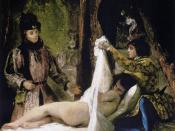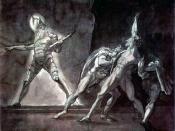John Donne was to most, considered a metaphysical poet, or a poet who finds their inspiration on expressing the world not as it would be universally revealed but in the world as science and philosophy account it. The poem "The Apparition" lacks many of the general characteristics that distinguish metaphysical poetry but continues to be classified as a metaphysical representation (Norton, 1). "The Apparition" contains at least three transformations of feeling. The manifestation success of this relationship gives the speaker so much pleasure that he revokes the suggestion he suggested in the beginning, the idea of threatening his lover into more agreeable behavior because he believes he would enjoy her chastisement more than her reformation. The speaker of the poem seems to feel that spite appears more reputable than vice. In this thinking the speaker seems to not only threaten her as she is awake but also in her sleep.
"The Apparition" announces the theme in the beginning, a theme that was very well-used at this time especially by Shakespeare, the death of an adoring man because of the malice of the woman he loves. The speaker addresses his mistress as murderess, during the Elizabethan era when a poet is being killed or wounded, this usually means he has been rejected. "When by thy scorn, O murderess, I am dead" (Line 1). The speaker is accusing his lover that because of her disdain she has killed something inside of him. The speaker states that because she has rejected him, she believes herself to be free from all of his harsh words and begging. " And that thou think'st thee free / From all solicitation from me" (2-3). This entails that because she has rejected him she believes he will not bother her again, and...


